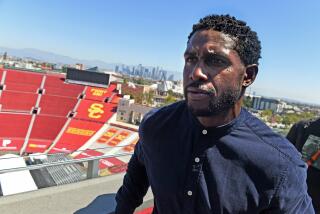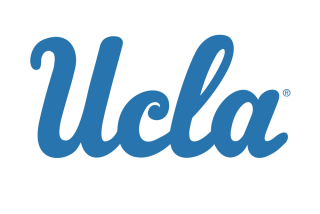NCAA shouldn’t pile on USC
Pat Haden mentioned out loud in his office only days ago that 85% of his job was great.
“And 15% of it … is full of angst,” USC’s director of athletics said.
Welcome to the angst part.
New allegations from the old regime have interrupted the Trojans’ comeback campaign and threaten to put the program in an even deeper ditch.
If reports prove true that football running back Joe McKnight and basketball player Davon Jefferson received improper benefits, the NCAA has the option to reopen the book it threw at USC in 2010.
Could the NCAA add to the original penalties that included a two-year bowl ban and the loss of 30 scholarships? Yes.
Should the NCAA do anything more? No.
Will the NCAA do something radical? Not likely, but stay tuned.
Trying to predict how the NCAA will act is a job that requires a hard hat. The organization of often paralyzing due process abandoned it completely in July to adjudicate the Penn State scandal.
The NCAA granted President Mark Emmert czar power to unilaterally act in undeniably extraordinary circumstances.
Then last week, stunningly, the larger body cleared North Carolina of charges in a widespread academic fraud case. The reasoning, best as one could tell, was that it was within the rules to offer bogus, easy-A classes to athletes as long as the bogusness was available to all students.
Not even members of the NCAA are always sure what’s coming next.
“A lot of people in the business shake their heads,” Tom Yeager, former chairman of the NCAA infractions committee and current commissioner of the Colonial Athletic Assn., said Wednesday.
USC, in the sanctions context of our times, does not deserve more than an additional wrist tap. The McKnight-Jefferson case only affirms the NCAA’s original contention that “high-profile athletes demand high-profile compliance.”
USC Nation — and some of us in the media — might owe the NCAA an apology for saying/suggesting/screaming that the original penalties were excessive.
This latest chapter might raise the sanctions to their proper level of appropriateness. McKnight-Jefferson appears, with less talented players, to be an appendage to Bush-Mayo.
The key question for the NCAA infractions committee is to ascertain whether it would have handed out different penalties had it known about the latest allegations.
The good news for USC is that the NCAA shot so high the first time, it might keep its gun in the holster. Or the NCAA could feel the reflexive need to restrict phone calls or visiting hours and/or take a couple of more scholarships away.
The NCAA is also hemmed in by the Penn State ruling in a case the infractions committee never got to hear. Penn State suffered a four-year bowl ban, debilitating scholarship losses and a $60-million fine.
The problem is that there isn’t much space between USC’s current penalties and those levied in perhaps the worst scandal in the history of sports.
Any NCAA decision after Penn State is subject to dissection. “It’s out there,” Yeager said of the issue.
It is also significant that the allegations involving McKnight and Jefferson happened on the watch of a school president, athletic director and head coach who are no longer there.
Anyone who has filled out the paperwork required to watch a USC practice knows how stringent the school’s compliance program has become.
Many think Haden and his staff have created a template for oversight. He is a member of an NCAA enforcement working group that is helping to revamp penalty procedures, and you can almost see the do-right conviction in his face. “You never quite sleep with both eyes closed,” he recently said.
The NCAA should have a problem with USC only if it is determined that the current regime provided cover for the past regime. That certainly does not seem to be the case.
The last time Haden covered up may have been in the pocket as quarterback of the Rams, surrounded by Minnesota Vikings.
The latest revelations reflect more on the former athletic director and his sidekick coach. The “Saint” Pete Carroll era is growing murkier than a cup of Seattle coffee.
The NCAA infractions committee, it needs to be noted, has the discretion to consider the distance USC has put between now and then.
“Yes, it can matter,” Yeager said. “It’s not necessarily a beat all to end all. There are so many different factors.”
Some programs try to pretend they are complying, but the program under Haden doesn’t appear to be a put-on.
“There is a new atmosphere, a commitment to the process.” Yeager said. “If you had to pick one — will it help you or hurt you? — you pick it helps you. But to what degree has to be factored in.”
USC, you could argue, already got the third degree.
Why pile on with the fourth?
More to Read
Go beyond the scoreboard
Get the latest on L.A.'s teams in the daily Sports Report newsletter.
You may occasionally receive promotional content from the Los Angeles Times.











